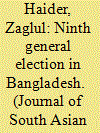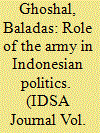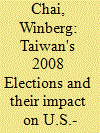| Srl | Item |
| 1 |
ID:
183446


|
|
|
|
|
| Summary/Abstract |
The author considers the development of Taiwan's position on historical claims to the waters, islands, skerries, and resources of the South China Sea under international law. The article compares the approaches of Taiwan's two leading political parties (Nationalist and Democratic Progressive) to substantiating the country's claims on the natural resources and adjacent waters. The reasons for the emergence and disappearance of the concept in Taiwanese law of "historic waters" to which the jurisdiction of the Republic of China (Nationalist China) should presumably extend are discussed in detail. Special attention is given to Taiwan's measures for the "effective occupation" of two islands (Taiping and Pratas) in the South China Sea. Changes in Taiwan's official position under different administrations are analyzed. While agreeing on everything where Taiping Island is concerned, the Nationalist and Democratic Progressive parties differ over all other pieces of land in the South China Sea. De facto correspondence of the foreign policy positions of Mainland China and the Nationalists, stemming from ideas of a common Chinese identity, is revealed in examining approaches to interpreting the notorious "U-shaped line." The Progressive Democrat-ic Party's attitude toward the South China Sea is due to the Taiwanese identity of its supporters. An obvious contradiction is noted: On the one hand, the Progressive Democrats proclaim the sovereignty of Taiwan (the Republic of China) over all islands in the South China Sea while supporting the unity of the "two shores of the Strait" on the issue of China's territorial integrity. On the other, it pragmatically recognizes the impossibility of actually exercising its nominal sovereignty over the disputed territories, and its doubtfulness from the viewpoint of international law. Nuances in Taiwan's attitude toward the Hague Tribunal's verdict on the Philippines' suit against China, reflected in a number of government statements, are examined in detail. Reasons for the Tribunal's refusal to recognize Taiping Island, the largest in the Pratas group, are identified.
|
|
|
|
|
|
|
|
|
|
|
|
|
|
|
|
| 2 |
ID:
111683


|
|
|
|
|
| Publication |
2012.
|
| Summary/Abstract |
In the 2010 Swedish general elections the nationalist party Sverigedemokraterna (SD) crossed the threshold and entered parliament. The other parties in parliament reacted with strong antagonism; the mainstreaming of the 'radical right' had finally come to Sweden. This article analyses the media coverage of the SD following the 2006 elections, when it emerged as a high-profile party in the public arena. The presence of the SD in Swedish politics encourages both SD allies and opponents to emphasize their views on what constitutes social cohesion in Sweden. We see the public debate surrounding the SD as a rhetorical struggle between different nationalist claims.
|
|
|
|
|
|
|
|
|
|
|
|
|
|
|
|
| 3 |
ID:
104394


|
|
|
| 4 |
ID:
176982


|
|
|
| 5 |
ID:
083256


|
|
|
|
|
| Publication |
2008.
|
| Summary/Abstract |
Outgoing Taiwanese President Chen Shui-bian's Democratic Progressive Party (DPP) was defeated in the historic 2008 presidential and legislative elections, and voters returned the reins of government to the long-ruling Nationalist Party (KMT). The author analyzes the KMT's return to power after eight years of DPP rule, its significance, and its potential to create new stability in East Asia and better cooperation between the United States and Taiwan. The author also examines the reasons for the DPP's resounding defeat, including its traditional oppositional role in Taiwanese politics and its failure to deliver on its promises to reduce corruption and maintain economic well-being. The author further analyzes the DPP policies' disastrous impact on Taiwan's domestic scene and its regional alliances. The author concludes with a prediction of what the KMT's return will mean for U.S.-China-Taiwanese relations.
|
|
|
|
|
|
|
|
|
|
|
|
|
|
|
|